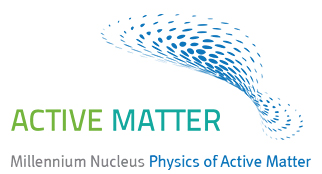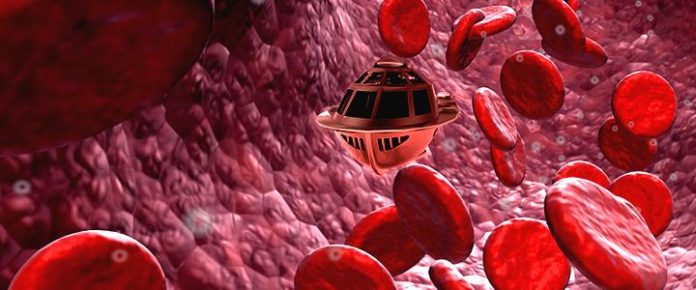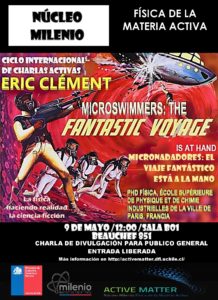Four foreign guests will visit the Millennium Nucleus of Active Matter to share with students and give lectures open to the public.
In 1966, 20th Century Fox premiered “Fantastic Voyage” in the United States; a sci-fi film that told the story of a journey into the human body in a manned submarine, reduced in size, whose passengers try to save the life of a scientist with brain damage. The effect of miniaturization is only one hour so is a life or death feat.
This film, which inspired Asimov and Dalí in their homonymous works and which will soon have a remake in 3D by James Cameron, today promises to become a reality thanks to the latest advances in physics and microswimmers.
This fascinating topic is the one Eric Clément will address in his talk “Microswimmers: The fantastic voyage is at hand” that will be held on May 9th, at 12:00 p.m., at Beauchef campus of the University of Chile and organized by the Millennium Nucleus Physics of Active Matter.
This is the first of a series of four international talks that will be held by this center housed in the Department of Physics of the Faculty of Physical and Mathematical Sciences of the University of Chile and will be open to all public.
More than science fiction
Eric Clément, academic, and researcher at the Higher School of Physics and Industrial Chemistry of Paris (ESPCI, France), is an expert in microswimmers, who has spent 20 years studying the physics of granular media, and he will be visiting Chile between May 2nd and 15th. The reason is to know the Nucleus, do a master class for students of the center and give a dissemination talk open to all public.
The French physicist tells that, in 2009, the National Science Foundation – the main funding agency of EE.UU.- made a funny allusion to the film by Richard Fletcher, by headline one of his announcements as “The Fantastic Voyage is not so bizarre.” Since then, he took the name for his talk. “Even today human reduction is still unthinkable, but clearly this last decade has opened many concrete possibilities to manufacture, organize and control objects and machines of micro and nano sizes, traveling in small complex environments with the exclusive dedication to carry out a specific task. The current possibility of manufacturing complex micro-sized 3D objects has made possible the development of many hybrid solutions that integrate artificial and biological components. In this presentation, I will review some of the most recent developments in the field of microswimmers with very specific applications insigh,” he says.
In that sense, he calls physics students to attend his talk, “because it can awake their interest in one of the emerging and very interdisciplinary fields of statistical physics: the physics of active matter”. Also general public is invited because it will allow them to enter this type of subject, where the microswimmers are just an example; “they can immerse in this concept (active matter) that can go on scales, since it can describe the bacteria that move in complex environments, the dispersion of plankton in the sea, schools of fish, flocks of birds and, finally, the human crowds. Some people are also studying multitudes of active and evolutionary robots,” he says.
Currently, Eric Clément collaborates with several research teams and carry out a work in ESPCI “that allows the production of complex objects resolved on a microscopic scale that can be activated under the action of an external field, or through the coupling with biological entities,” he explains.
The next talks of this cycle are scheduled for August and December 2018 and for January 2019 and will bring to Chile Veronica Marconi, from the National University of Cordoba, Argentina; Olivier Dauchot, from the École Supérieure de Physique et de Chimie Industrielles de la Ville in Paris, France. And to Hartmut Löwen, from the University of Düsseldorf, Germany.
ERIC CLÉMENT TALK
Day: May 9th
Time: 12:00 p.m.
Place: Beauchef 851, Room BO1
Lecturer: Eric Clément, academic, and researcher at the Higher School of Physics and Industrial Chemistry of Paris (ESPCI), France.
Talk name: “A fantastic trip at hand”
Topic: Referring to the 1966 science fiction film that relates a manned trip to the interior of the human body, the French physicist will talk about the latest advances in microswimmers, its applications and the possibility of microrobots moving and being controlled in order to do specific tasks within an organism.
Talk in English
Free pass



